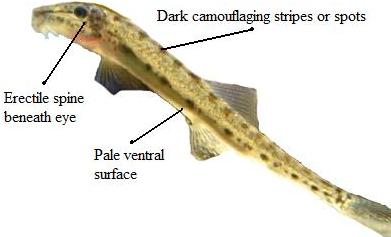Loaches: Difference between revisions
imported>Drew R. Smith mNo edit summary |
mNo edit summary |
||
| (One intermediate revision by one other user not shown) | |||
| Line 3: | Line 3: | ||
</includeonly> | </includeonly> | ||
[[image:Loachdiagram.jpg|400px|right]] | [[image:Loachdiagram.jpg|400px|right]] | ||
The various species of loach that are available to the aquarist come from India and Asia. They spend most of their time on the bottom of rivers and streambeds, hence their flat-bottomed bodies. A distinctive characteristic of this family is the erectile spine beneath the eye. It acts as a deterrent to predators, but it also tends to catch in the fish-keeper's net. The mouths of loaches are downturned and have barbels for detecting food. | '''Loaches''' are fish families in the order of the Cypriniformes. The various species of loach that are available to the aquarist come from India and Asia. They spend most of their time on the bottom of rivers and streambeds, hence their flat-bottomed bodies. A distinctive characteristic of this family is the erectile spine beneath the eye. It acts as a deterrent to predators, but it also tends to catch in the fish-keeper's net. The mouths of loaches are downturned and have barbels for detecting food. | ||
Like [[anabantids]] and some [[catfishes]], loaches can gulp atmospheric air at the water's surface and extract oxygen from it as it passes through the gut. Many species are nocturnal and hide among plants and rocks by day, emerging as darkness falls or when food appears at close range. Their natural diet includes worms and insects, but most loaches will accept prepared foods in captivity, especially tablets and other quick sinking forms. | Like [[anabantids]] and some [[catfishes]], loaches can gulp atmospheric air at the water's surface and extract oxygen from it as it passes through the gut. Many species are nocturnal and hide among plants and rocks by day, emerging as darkness falls or when food appears at close range. Their natural diet includes worms and insects, but most loaches will accept prepared foods in captivity, especially tablets and other quick sinking forms. | ||
Little is known of their reproductive behavior, but loaches have been induced to spawn in captivity by using hormone injections. Loaches in the ''[[Botia]]'' genus are long-established aquarium favorites. | Little is known of their reproductive behavior, but loaches have been induced to spawn in captivity by using hormone injections. Loaches in the ''[[Botia]]'' genus are long-established aquarium favorites.[[Category:Suggestion Bot Tag]] | ||
Latest revision as of 16:01, 12 September 2024
Loaches are fish families in the order of the Cypriniformes. The various species of loach that are available to the aquarist come from India and Asia. They spend most of their time on the bottom of rivers and streambeds, hence their flat-bottomed bodies. A distinctive characteristic of this family is the erectile spine beneath the eye. It acts as a deterrent to predators, but it also tends to catch in the fish-keeper's net. The mouths of loaches are downturned and have barbels for detecting food.
Like anabantids and some catfishes, loaches can gulp atmospheric air at the water's surface and extract oxygen from it as it passes through the gut. Many species are nocturnal and hide among plants and rocks by day, emerging as darkness falls or when food appears at close range. Their natural diet includes worms and insects, but most loaches will accept prepared foods in captivity, especially tablets and other quick sinking forms.
Little is known of their reproductive behavior, but loaches have been induced to spawn in captivity by using hormone injections. Loaches in the Botia genus are long-established aquarium favorites.
